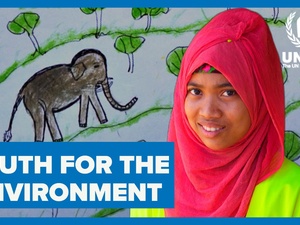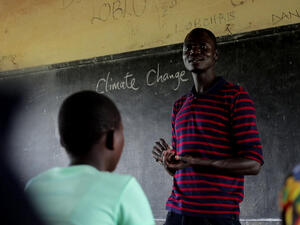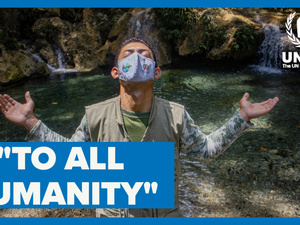UNHCR goes green in the field for World Environment Day
UNHCR goes green in the field for World Environment Day

Firewood distribution at Kenya's Dadaab camp. UNHCR is trying to reduce refugee reliance on firewood through a trial run of solar cookers in the camp.
GENEVA, June 4 (UNHCR) - UNHCR staff and refugees are raising awareness about environmental protection in refugee situations to mark World Environment Day on June 5, by cleaning up refugee camps, planting trees and other related events.
"Caring for the environment is not an option but a priority for both humanitarian and development agencies," High Commissioner Ruud Lubbers said in a written message to UNHCR staff to mark the day. He urged UNHCR staff to "take part in promoting sound environmental management in refugee operations and in the workplace, thereby contributing to ensuring that natural resources are protected and sustainably managed for future generations."
His appeal has translated into action on the ground. In Kenya, refugees mobilised to clean up camp grounds, concentrating on the hundreds of plastic bags that blight the camps and neighbourhood. Students at the Dadaab primary school cleaned up the school compound, while UNHCR and its partners tackled the common main gate area. Similar clean-up campaigns were held in other refugee operations, including in Ethiopia and Liberia.
Cultural activities and special events focusing on the environment have also been planned. In Sudan's Kasala Wad Sherife camp, theatre performances, poetry readings and poster displays will raise awareness among the communities. Music, dancing and drama will get the message across in camps in Tanzania and Ethiopia.
In eastern Sudan, group discussions with youth, women's groups, environmental committees and community elders are being held on how refugees and the local community can contribute to environmental conservation. In Liberia, teachers are receiving special training on environment issues and outreach activities are planned in schools, communities and camps for internally displaced people.
Sporting events are also being held to bring communities together on World Environment Day, ranging from a bicycle race in Monrovia, Liberia, a girls' football match in Tanzania, and sports competitions in Ethiopia between Roots and Shoots environment clubs which include refugees as well as Ethiopians.
Awards are being given in some operations to refugees, aid agencies and local community members who have made extra contributions to environmental conservation. In Tanzania, award winners include refugees who have chosen to use mud bricks to build their huts rather than cutting down trees for wood as construction materials, and refugees who have been committed to raising kitchen gardens.
Those who have been on the forefront in educating their fellow refugees about environmental conservation issues will also be recognised. In Ethiopia, awards will go to environmental working groups, Roots and Shoots Clubs, community mobilisers among refugees and local populations, and the best agency at the camp level in demonstrating different environmental activities.
One of the key environmental challenges faced in refugee operations is deforestation, as an influx of refugees can put additional pressure on local forests when they gather firewood to prepare meals and heat water. Tree planting campaigns for World Environment Day in Ethiopia and Zambia recognise this crucial issue and make a step towards mitigating deforestation. An exhibition of new parabolic solar cookers that can help reduce refugee reliance on firewood has also been on display at UNHCR headquarters in Geneva in the week leading up to World Environment Day.
UNHCR recognises that the relationship between environmental management, refugees and host communities is often extremely sensitive. By addressing environmental concerns and reducing the impact of refugees on the local environment and communities, protection of refugees is strengthened, as are the agencies activities on the ground. Sustainable environmental management maintains the safety and dignity of refugees and helps uphold the institution of asylum.









